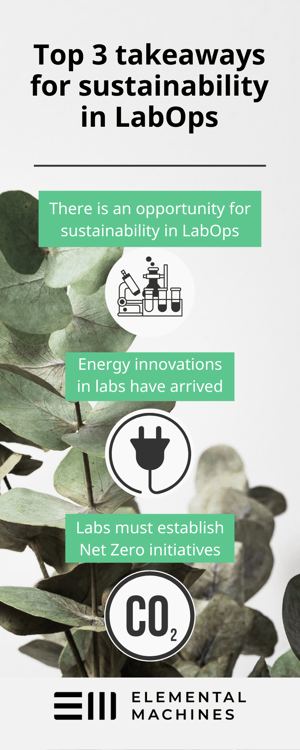
By Elemental Machines
Did you know that in 2015 the global pharmaceutical industry’s carbon intensity was 55% higher than the automotive industry? How about healthcare represented 4.4% of total global carbon emissions in 2019?
In fact, research laboratories use five to ten times greater energy per square foot than a typical office space. Combine this with the fact that the biotech and pharma markets continue to grow at unprecedented rates, and it is clear that these industries have significant environmental footprints. As such, sustainability initiatives may soon become one of the largest competitive advantages that any size company in these sectors can deploy.

While these statistics may be shocking, the need for research laboratories is not likely to vanish into thin air. Therefore, it is up to the collaborative efforts of laboratory operations (LabOps) professionals and their management in biotech and pharma companies to be proactive and get serious about implementing sustainable practices in their organizations.
In our white paper, LabOps and sustainable energy: The win-win paradigm, we explore the current state of energy usage in research laboratories along with opportunities to implement and improve sustainable initiatives in the biotech and pharma industries.
Top three takeaways about sustainability in LabOps
1. There is a real opportunity for sustainability in LabOps
Sustainability in the lab begins with simple to implement practices – such as chilling ultra-low temperature freezers to -70° C instead of the traditional -80°C, which can reduce energy consumption of the freezer by up to 40%. The biotech and pharma industries could save as much as $1.25 billion annually by decreasing energy usage by 30%.
2. Energy innovations in labs have arrived
Energy efficiency may not be as difficult as it seems. The same concepts from your home apply to the lab, such as switching from halogen to LED bulbs can provide significant energy savings. Furthermore, monitoring equipment such as HVAC, pumps, temperature and pressure gauges, separators, etc. can reduce energy costs up to 30%.
3. Labs must establish Net Zero Initiatives
Over 70 countries have set net-zero energy targets to reduce carbon emissions 45% by 2030 and reach net zero by 2050. However, most biotech and pharma companies have not established targets that aligned with Net Zero initiatives. More ambitious targets must be set to work towards cutting carbon emissions.
Elemental Machines is dedicated to empowering LabOps professionals to adopt sustainable initiatives in their organizations. We partner with teams to provide valuable, easy-to-use data insights that help reduce unnecessary energy consumption and move the needle on green initiatives in the lab.